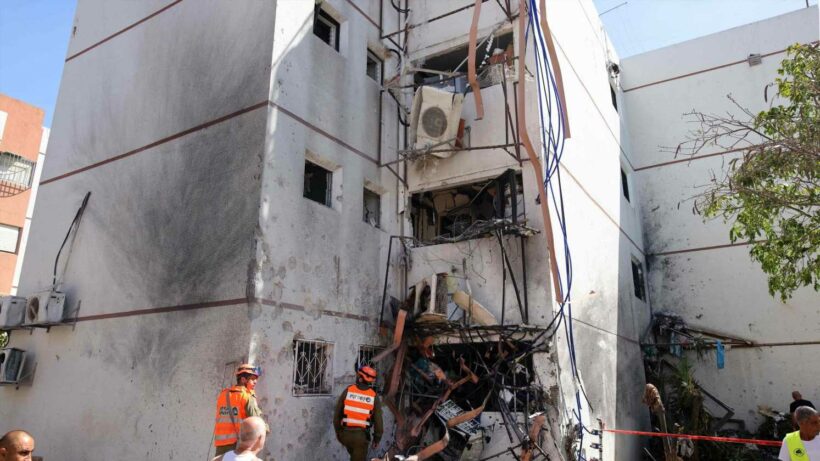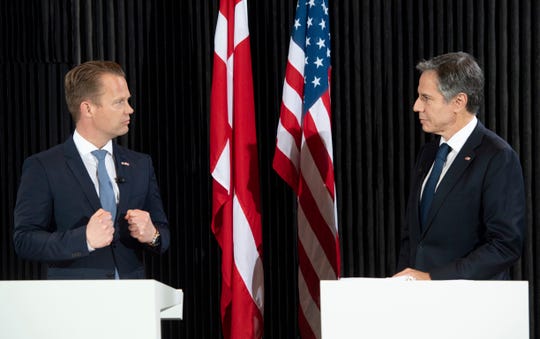U.S. Secretary of State Antony Blinken said Monday he has asked Israel for any evidence of Hamas operating in a Gaza building housing news bureaus that was destroyed by an Israeli airstrike over the weekend, but hasn’t seen any.
Blinken spoke at a news conference in Copenhagen, Denmark, as pressure is increasing on the Biden administration to ask for a ceasefire in the Israeli-Palestinian conflict.
Israel destroyed a building housing The Associated Press and Al Jazeera and claimed that Hamas used the building for a military intelligence office. Prime Minister Benjamin Netanyahu has called the building a “perfectly legitimate target” and told CBS’ “Face the Nation” on Sunday that Israel passes such evidence through intelligence channels.
“Shortly after the strike we did request additional details regarding the justification for it,” Blinken said Monday. He declined to discuss specific intelligence, saying he “will leave it to others to characterize if any information has been shared and our assessment that information.”
But he said, “I have not seen any information provided.”
The latest: Israeli warplanes stage more heavy strikes across Gaza City as Netanyahu warns attacks will go on
US Secretary of State Antony Blinken looks at Danish Foreign Minister Jeppe Kofod, during their joint press conference, following their meeting at the Danish Ministry of Foreign Affairs, Eigtveds Pakhus, in Copenhagen, Denmark, on May 17, 2021. Blinken is seeing Danish leaders as well as top officials from Greenland and the Faeroe Islands in Copenhagen on Monday before he heads to Iceland for an Arctic Council meeting that will be marked by his first face-to-face talks with Russian Foreign Minister Sergey Lavrov at a time of significantly heightened tensions between Washington and Moscow. (Photo: Saul Loeb, AP)
Over the weekend, U.N. Security Council diplomats and Muslim foreign ministers convened emergency meetings to demand a stop to civilian bloodshed as Israeli warplanes carried out the deadliest single attacks in nearly a week of Hamas rocket barrages and Israeli airstrikes.
President Joe Biden gave no signs of stepping up public pressure on Israel to agree to an immediate cease-fire despite calls from some Democrats for the Biden administration to get more involved.
His ambassador to the United Nations, Linda Thomas-Greenfield, told an emergency high-level meeting of the Security Council that the United States was “working tirelessly through diplomatic channels” to stop the fighting.
But as battles between Israel and Gaza’s militant Hamas rulers surged to their worst levels since 2014 and the international outcry grew, the Biden administration — determined to wrench U.S. foreign policy focus away from the Middle East and Afghanistan — has declined so far to criticize Israel’s part in the fighting or send a top-level envoy to the region. Appeals by other countries showed no sign of progress.
Thomas-Greenfield warned that the return to armed conflict would only put a negotiated two-state solution to the decades-old Israeli-Palestinian conflict even further out of reach. However, the United States, Israel’s closest ally, has so far blocked days of efforts by China, Norway and Tunisia to get the Security Council to issue a statement, including a call for the cessation of hostilities.
Israeli rescue teams inspect the damage outside a building that received a direct hit by rockets from the Gaza Strip, in the southern Israeli city of Ashdod, near the border between Israel and the Hamas-run Palestinian territory, on May 17, 2021. Israel's army said about 3,000 rockets had been fired since May 10 from Gaza towards Israel. Around 450 fell within the coastal strip, while the Iron Dome anti-missile system intercepted over 1,000, according to the army. (Photo: AHMAD GHARABLI, AFP via Getty Images)
In Israel, Hady Amr, a deputy assistant dispatched by Blinken to try to de-escalate the crisis, met with Israeli Defense Minister Benny Gantz, who thanked the U.S. for its support.
Blinken, on an unrelated tour of Nordic countries, made calls from the plane to Egypt and other nations working to broker a cease-fire, telling Egypt that all parties “should de-escalate tensions and bring a halt to the violence.”
Rep. Adam Schiff, Democratic chairman of the House intelligence committee, urged Biden on Sunday to step up pressure on both sides to end current fighting and revive talks to resolve Israel’s conflicts and flashpoints with the Palestinians.
“I think the administration needs to push harder on Israel and the Palestinian Authority to stop the violence, bring about a cease-fire, end these hostilities, and get back to a process of trying to resolve this long-standing conflict,” Schiff, a California Democrat, told CBS’s “Face the Nation.”
And Sen. Todd Young of Indiana, the senior Republican on the foreign relations subcommittee for the region, joined Connecticut Sen. Chris Murphy, the subcommittee chairman, in asking both sides to cease fire. “As a result of Hamas’ rocket attacks and Israel’s response, both sides must recognize that too many lives have been lost and must not escalate the conflict further,” the two said.
Biden focused on civilian deaths from Hamas rockets in a call with Netanyahu on Saturday, and a White House readout of the call made no mention of the U.S. urging Israel to join in a cease-fire that regional countries were pushing. Thomas-Greenfield said U.S. diplomats were engaging with Israel, Egypt and Qatar, along with the U.N.
Here are some major events leading to the current violence we see happening with what some are calling an all-out war between Hamas and Israel.
USA TODAY
Israel ‘wants to levy a heavy price’
Israeli airstrikes on Gaza City flattened three buildings and killed at least 42 people Sunday, medics said, bringing the toll since Hamas and Israel opened their air and artillery battles to at least 188 killed in Gaza and eight in Israel. Some 55 children in Gaza and a 5-year-old boy in Israel were among the dead.
Israeli Prime Minister Benjamin Netanyahu told Israelis in a televised address Sunday that Israel “wants to levy a heavy price” on Hamas. That will “take time,” Netanyahu said, signaling the war would rage on for now.
Representatives of Muslim nations met Sunday to demand Israel halt attacks that are killing Palestinian civilians in the crowded Gaza Strip. Saudi Foreign Minister Faisal bin Farhan called on “the international community to take urgent action to immediately stop military operations.”
The meeting of the 57-nation Organization of Islamic Cooperation also saw Turkey and some others criticize a U.S.-backed push under which the United Arab Emirates, Bahrain and other Islamic nations signed bilateral deals with Israel to normalize their relations, stepping over the wreckage of collapsed international efforts to broker peace between Israel and the Palestinians long-term.
“The massacre of Palestinian children today follows the purported normalization,” Iranian Foreign Minister Mohammad Javad Zarif said.
At the virtual meeting of the Security Council, U.N. Secretary-General Antonio Guterres said the U.N. was actively engaging all parties for an immediate cease-fire.
Returning to the scenes of Palestinian militant rocket fire and Israeli airstrikes in the fourth such war between Israel and Hamas, “only perpetuates the cycles of death, destruction and despair, and pushes farther to the horizon any hopes of coexistence and peace,” Guterres said.
Eight foreign ministers spoke at the Security Council session, reflecting the seriousness of the conflict, with almost all urging an end to the fighting.
Biden’s predecessor, Donald Trump, had thrown U.S. support solidly behind Israel, embracing Netanyahu as an ally in Trump’s focus on confronting Iran. Trump gave little time to efforts by past U.S. administrations to push peace accords between Israel and the Palestinians, instead encouraging and rewarding Arab nations that signed two-country normalization deals with Israel.
Biden, instead, calls Middle East and Central Asia conflicts a distraction from U.S. foreign policy priorities, including competition with China.
He’s sought to calm some conflicts and extricate the U.S. from others, including ending U.S. military support for a Saudi-led war in Yemen, planning to pull U.S. troops from Afghanistan, and trying to return to a nuclear deal with Iran that Israel opposes.
Knickmeyer reported from Oklahoma City and Lederer from New York. Associated Press writers Jon Gambrell in Dubai and Lisa Mascaro in Washington and AP Diplomatic Writer Matthew Lee contributed to this report.
Source: Read Full Article


